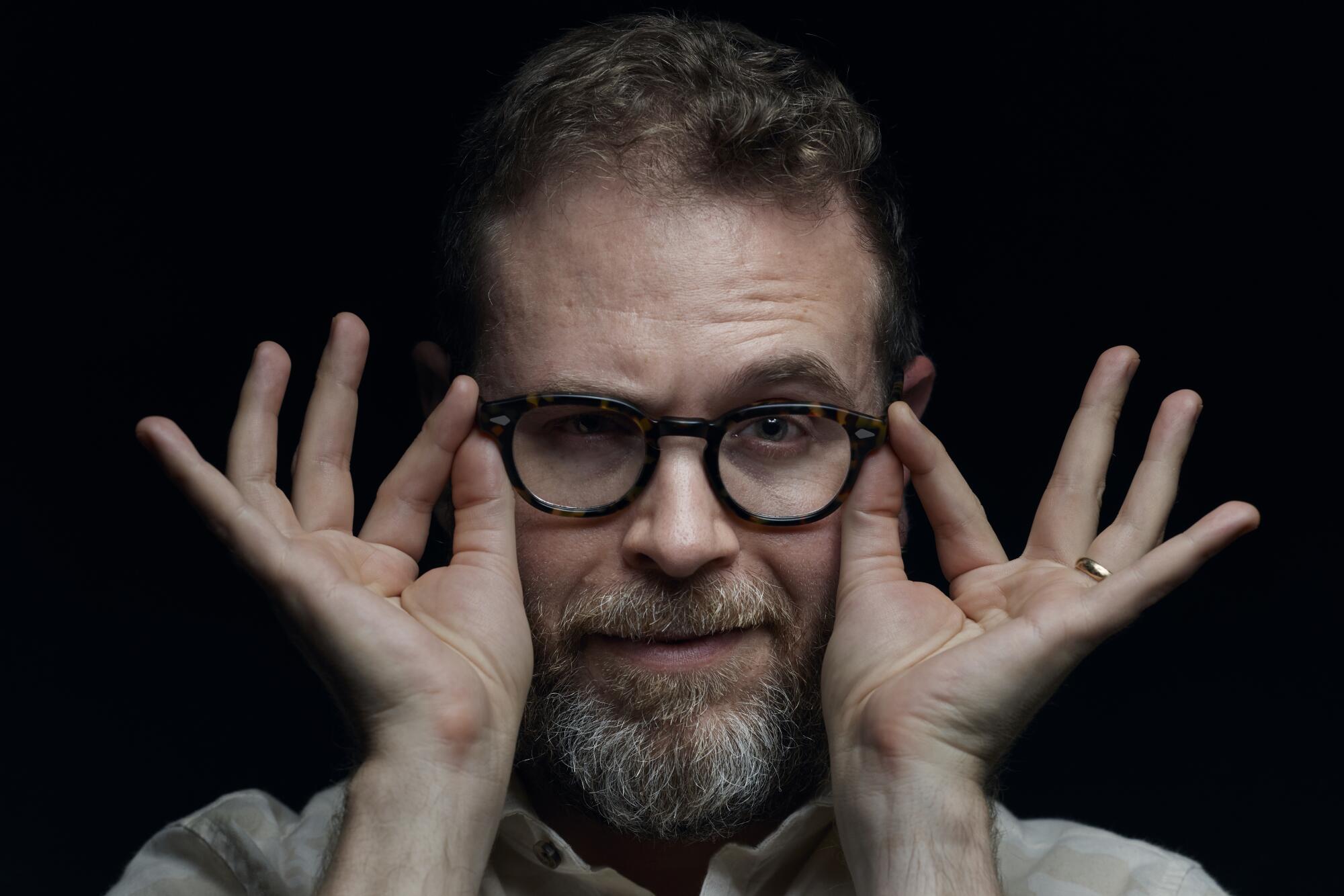When Netflix launched the streaming era it had a simple promise: One place for everything. But when entertainment studios launched their own services, suddenly every major company wanted to be The Streamer, racing to fill their platforms with the most content possible to beat out competitors.
Amid the chaos of the 2010s streaming wars Dropout — a streaming service launched by comedy internet-video giant College Humor in 2018 — was born. The platform specializes in unscripted comedy shows bolstered by its large cast of comedians from the world of improv.
“Dropout has to differentiate itself,” says the company’s Chief Executive Sam Reich about developing the streamer’s brand. “I’m interested in, ‘If you’re gonna do comedy right now, what does that mean?’”
After College Humor’s parent company InterActiveCorp was dissatisfied with the streaming service’s subscriber numbers in 2019, it became apparent that a sale was on the way. Then-chief creative officer Reich pitched a radical alternative to selling the service to a major media company: have Reich take control of College Humor in exchange for IAC maintaining a minority stake in the company. According to Reich, the deal was approved in less than two months.
To keep the company afloat, College Humor laid off the majority of its more than 100-person staff in early 2020. Reich and Chief Operating Officer David Kerns whittled the company down to seven full-time employees. The company shifted the business’ focus to making content for its streaming service and later rebranded from College Humor to Dropout.
“We needed to be profitable the moment that we took over the company,” Kerns explains. And despite a global pandemic that brought major entertainment studios heavy losses, in 2020 Dropout succeeded in making a minor profit in its first year under Reich’s ownership.
The key to Dropout’s success was its streamlined approach to developing shows for the platform. The team focused on what was most successful on the service before Reich’s acquisition. “I believed you could boil Dropout down to just its most celebrated programming, and it would survive well enough on that,” says Reich.
Those shows now include ‘Dimension 20’ — a series depicting comedians playing ‘Dungeons & Dragons’ campaigns — that is in its 26th season. There’s also “Game Changers,” a game show where the game changes every episode that is hosted by Reich; “Make Some Noise,” where players attempt short improv challenges; and “Um, Actually,” a game show where guests prove their knowledge on niche and nerdy topics.

Dropout CEO Sam Reich has a background in sketch comedy.
(Anthony Avellano / For The Times)
“We are doing loosely scripted, improvisational content. And this can be batch recorded and batch shot,” says Brennan Lee Mulligan on the common thread between Dropout’s shows that made “Dimension 20” appealing to the company as it was being relaunched. Mulligan, creator of “Dimension 20,” has a background in improv and is a minority owner in Dropout.
The company’s development process varies from each show. For something like “Game Changer,” which Dropout’s supervising producer Ebony Elaine Hardin describes as “self-contained chaos,” the show is in constant development. Hardin says the team debriefs after each season to discuss what worked as they develop the next installment. Director of development Paul Robalino says that rather than traditional writers rooms in TV development, “Game Changer” is more “assignment-based”: a collection of 10 writers are given a week to write for an episode.
Reich’s involvement in “Game Changer” is not only as host. With a background in sketch comedy, Reich is also involved in its development and production, describing his time spent as 30% on Dropout shows and 70% on the company. “I took the classic actor to director to producer to internet executive to CEO to game show host pipeline,” Reich says. “It’s a good thing ‘Game Changer’ is as popular as it is or I would never be able to justify the amount of my job that’s putting that show together.”

“One of the main things that our CEO does is work. He makes a show … I think it’s pretty cool that our CEO is in there thinking about a good joke and a good idea for an episode,” says Mulligan on Reich’s creative involvement with Dropout’s shows.
So how does a niche streaming service sustain over a dozen shows ongoing at any given time? “Dropout is a very practical place,” says Hardin. The company operates out of a modest studio in Silver Lake with two soundstages: one a permanent set for “Dimension 20” and the other rotating between several of its shows. They own the majority of their filming equipment, eliminating the need for costly camera rentals. Dropout also has an on-site art studio where props are constructed and designed by production designer Rick Perry. And while a network TV comedy episode is often shot over the course of several 12-hour days, many of Dropout’s shows shoot several episodes in an eight-hour day.

Dropout’s David Kerns, from left, Sam Reich, Paul Robalino and Ebony Elaine Hardin.
(Anthony Avellano / For The Times)
But the ethos behind Dropout’s mission is based around people. Hardin emphasizes their sets have a “no toxic behavior” rule. The chemistry between its cast members is a major part of the company’s success, many previously worked together in improv troupes. For the audience, the effect of watching a Dropout show can be the feeling of hanging out with your friends. And Dropout’s leadership is mindful of that relationship; Kerns says the company avoids ads and sponsored content on the site due to an “understanding with our audience of this is a safe and comfortable space … the moment we’re trying to get people to buy Sprite inside of that ecosystem I think that feels icky.”
“We get messages every day from people letting us know what this silly stuff we’re doing online means to them,” says Dropout cast member Vic Michaelis, who hosts the streamer’s improv interview show “Very Important People.”
“We have by some people been called a friendship simulator,” says Reich, who acknowledges that the dedicated way its community engages with Dropout’s cast is an “inevitable byproduct of producing content for the internet.”
Dropout’s growth has also been fueled by the company’s social media accounts, which post clips from the streamer’s shows. While the company has become known for its online savvy, Reich explains that it’s not a complicated plan. “We’re doing very little socially apart from posting clips from our show. That is chiefly the social strategy, which is not rocket science.” Dropout also taps into social media when developing ideas for new shows: Its recent stand-up-based series “Crowd Control” was inspired by a recent boom in crowd work comedy driven by TikTok and social media algorithms.
Dropout now boasts over 1 million subscribers and 40 full-time employees. Reich describes the demographic of the average subscriber as being in their mid-20s, skewing nerdy, being a comedy or internet fan, and often from a diverse background with progressive politics. But as the company has grown so has its subscriber base, with growing numbers of older fans and interest in more countries outside of the U.S.

“We needed to be profitable the moment that we took over the company,” says Chief Operating Officer David Kerns of Dropout’s nimble rebrand.
(Anthony Avellano / For The Times)
Part of the appeal of Dropout is its public socially-conscious business practices. Since the company’s productions aren’t staffed entirely by union employees, Dropout engages in profit-sharing in lieu of traditional residuals. Full-time employees receive yearly bonuses and all people who work on Dropout productions, from cast members to production assistants, receive a share or profit calculated based on the number of days worked in a given year.
Reich describes the company as “pro-labor,” which is fitting since his father is Robert Reich, former secretary of Labor under President Clinton. For the people who work for Dropout, this philosophy is an extension of the human-centered way the company operates. “We talk about Dropout as an individual entity and it’s not,” says Michaelis. “Dropout is the people that run it.”
While L.A. is experiencing a downturn in production rates, Dropout’s cast and employees are thankful to be able to create a “sustained comedy eco-system,” in Robalino’s words, as many cast members appear on multiple Dropout shows. Michaelis adds that “the comedy scene, especially the improv scene in L.A., has always been a ladder of people raising themselves up and then you’re pulling the people up from behind you. And the nice part about Dropout is there’s a very real and tangible way to do that for your friends.”
Hardin says that Dropout is “doing their own thing by intention.” For Reich that “thing” is being unapologetically and whole-heartedly focused on comedy. Describing a landscape with streaming services filled with genre mash-ups — comedy thrillers or comedy dramas — aside from stand-up specials, Reich sees a gap in the market for comedy that exists only as comedy.
Now Dropout is figuring out how to grow. The company has recently expanded its live show efforts, touring its comedy programming and “Dimension 20” — which sold out Madison Square Garden to almost 20,000 fans in January. Dropout is also looking to expand into scripted programming, including an animated series in development. And mainstream media is beginning to notice what Dropout is creating: The latest season of “Saturday Night Live” has Jeremy Culhane, a Dropout regular, joining the main cast.
The company still has one major white whale: an Emmy nomination. Dropout has invested in several Emmy campaigns for its shows but despite its efforts (and a $50,000 investment for this year’s campaign), it has yet to break through. Kerns says that this push goes beyond just a publicity campaign and speaks to a lack of innovation in the Television Academy’s rules. “Internet content, or new media, is actually just media,” Kerns says. “[An Emmy] is the acknowledgment of something that I think is already a reality … [it] would solidify for many others that this is our time, that we are on par with all these other TV shows.”

Dropout CEO Sam Reich also hosts the streamer’s game show “Game Changers.”
(Anthony Avellano / For The Times)
Dropout is not the first niche streaming service. But over the past five years it has slowly proved how internet content can turn into a profitable business with a stable infrastructure. And while Reich says the company does not have a strict plan for its future (“we are stitching these pants as we’re wearing them”), he is tapping into that hopefulness of the online comedy space that started his career 20 years ago to guide Dropout.
“I love that internet, and that almost feels like a weirdly controversial statement to make at this point in time,” Reich says. “I feel like there’s lots of very appropriate conversation about the way social media has toxified us but I still love the internet as a place where weird can thrive. … And I think that my, and some of our other creatives’, sheer enthusiasm for that continues to dictate some of the direction for Dropout.”
And for those who work for Dropout in any capacity, the company’s approach to creativity reveals a possible model in the media industry that decades of corporate restructuring and mega-mergers had previously made impossible: one fueled by individual creators and small companies being able to sustain a living off of making entertainment for dedicated pockets of fans.
“We don’t want to be f— billionaires,” says Mulligan. “We just want to make art and pay our rent and have a family. Most people are normal, most people just want a community and a family and to do some work and be with people that they love and respect. And we get to do that. And whatever’s going on in Hollywood at large, if you have eyes to look there’s Dropout, and there are many places like Dropout, and they’re bubbling up like a mycelium network all over the world.”


